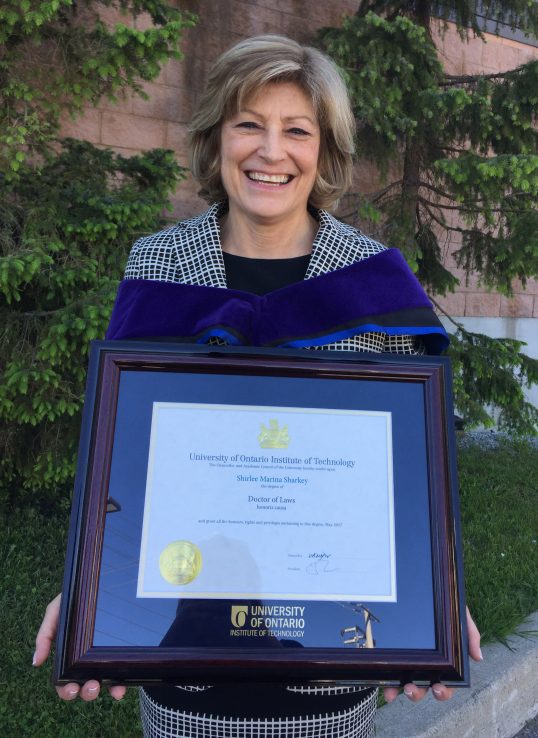
When Canada was celebrating its 125th anniversary, Shirlee Sharkey had just graduated with a Masters in Health Administration from the Institute of Health Policy Management and Evaluation. For the past 25 years, Sharkey has remained steadfast in her quest to find solutions to complex problems within the Canadian health system and beyond. She is currently the CEO of Saint Elizabeth Health Care, a charitable not-for-profit social enterprise, where she is constantly looking for new and innovative ways to draw on her passion of keeping patient centered care at the forefront.
As we at IHPME prepare to celebrate 70 years of high quality education for today’s health systems leaders, we sit down with Shirlee, who also recently received an honorary doctor of laws degree from UOIT, to speak with her about her passion for patient centered care and how she has worked to evolve Saint Elizabeth Health Care in her time as CEO.
When you first graduated and began your career journey, what were some of your aspirations?
SS: In 1992 when I made the decision to go back to school and pursue further education, my main goal was to contribute to the healthcare system in a meaningful way. I knew that in order to do so, I would need to broaden my experiences and knowledge and so I chose to enter the MHSc program at the Institute of Health Policy, Management and Evaluation.
You have been referred to as a health systems expert and advisor, how did the MHSc degree and your own personal experience prepare you to be the successful leader that you are in today’s health care sector?
SS: Thank you for saying that. I’ve had a number of unique experiences that have collectively contributed to my success. Early in my career, I worked in the world of hospitality and then as a visiting nurse, prior to moving into health leadership positions. It took a lot of courage to move from a teaching hospital to the community, it was almost like entering the Wild West. These experiences provided me with a different perspective, and the realization that fundamentally this work is all about people. How you care for people, how you accommodate them and how your services connect with them. These are all mindsets that the curriculum at IHPME prepares you for, they teach you to think about patient care in new and exciting ways.
Saint Elizabeth has been working in community health care since 1908. When you joined as CEO and President, what were some of the developments you were hoping to foster to create an impact for the current health system?
I didn’t start in 1908 though I have been here for quite a while! But when I look back to where I was 25 years ago, and why I was interested in moving to Saint Elizabeth, I remember my focus on homecare. At that time, I really felt homecare was under-utilized, under-valued, and not understood as well as it could be. This was a real opportunity for me to step in and help grow Saint Elizabeth while increasing our ability to impact people and their lives. We’ve coined the term, spreading hope and happiness, which has truly been the vision of Saint Elizabeth and continues to be.
Ontario and Canada’s health system is a complex one, how do you and your team at Saint Elizabeth approach issues around palliative care and long-term care to find innovative solutions?
SS: Innovation is an interesting concept. I have always thought of innovation as the engine for change that is necessary in healthcare. The roots of my passion for innovation came in part from the IHPME curriculum which helped me to understand that change is necessary, especially in our healthcare system. We have looked at a variety of change innovation strategies at Saint Elizabeth, such as process innovation particularly with respect to changing the model of home care. We have also utilized social innovation, which involves finding new solutions to deal with tough social problems. I would have to say the most exciting mode is disruptive innovation where you turn everything on its head to find a solution that works. In end of life care, we try to look at the challenges that are arising in a different way, and come up with new ideas that hopefully make the experience better for patients, families, and caregivers.
Three areas Saint Elizabeth is focusing on at the moment are Indigenous health, end-of- life care, and caregiver and wellness support. What are some of the key achievements in these areas that Saint Elizabeth has helped to foster and further develop?
I am very proud of what Saint Elizabeth has accomplished in each of these areas as a non-profit social enterprise. With end of life care we have funded over $4 million since 2015 to address the gaps and issues that occur in this phase of care, both locally and across the country. Our focus on caregiver support, is an example of disruptive innovation. We created “Elizz” which is a site geared towards all aspects of caregiving, from education to services and support. Currently we have over 2.5 million caregiver connections, which helps us to really understand the needs and experiences of family caregivers and the integral role they play in patient care and the health system. Lastly, our work with First Nations communities, which has been making a significant impact for more than 15 years. We are now partnering with over 500 communities and providing educational support so that health care can be provided close to home, within their own communities.
Why is it important for the health system to focus on long-term and in-home care?
As a society, it’s critical that we find new solutions for the aging population. The majority of Canadians want to remain at home, and this requires a different way of thinking in the health care community as well as a cultural shift. We need to be prepared to find different solutions for people who may require long-term care, and in turn, provide them with the information and services to support their preferences and choices. There was a recent study by CIHI, which showed that long-term care could have been delayed or avoided for more than one in five seniors. Unsurprisingly, health professionals in the community are generally more aware of the options to support people at home, and can assist patients in finding and designing effective care arrangements to suit their needs.
Having just received an honorary doctor of laws degree from UOIT, what are your plans for the future and your role as a health systems leader and expert advisor?
Receiving the degree was such a great honour, in fact I was very emotional that day. I was full of a sense of humility, pride, and I couldn’t help but reflect on my own graduation journey all those years ago. When I think of the future, I know the challenges will be endless – yet there is also great possibility. Right now at Saint Elizabeth we have over 9000 employees, who we refer to not just as health care providers but as leaders of impact. That on its own suggests we have an amazing opportunity to change the lives of people and influence what is happening in our healthcare system. I look forward to all of the celebrations, heartaches and good things to come.
What are your hopes for the future of end of life care and palliative care in Ontario and Canada?
Anyone who has gone through a family death experience or watched a loved one die, knows that it is life changing. It is a defining moment and it does change you. Our goal at Saint Elizabeth is to make sure that everyone – regardless of where they live, their health condition or financial situation – has the opportunity to experience the kind of death they want. That is the big picture and main goal of improving end of life and palliative care. In addition, I would like to see a greater level of discussion about dying and death, so that it becomes a more natural conversation for people as opposed to something that is frightening or mystical.
Related News

Sign up for IHPME Connect.
Keep up to date with IHPME’s News & Research, Events & Program, Recognition, e-newsletter.
Subscribe to Connect Newsletter
Get in Contact
Communications
Marielle Boutin
Email Address: ihpme.communications@utoronto.ca





